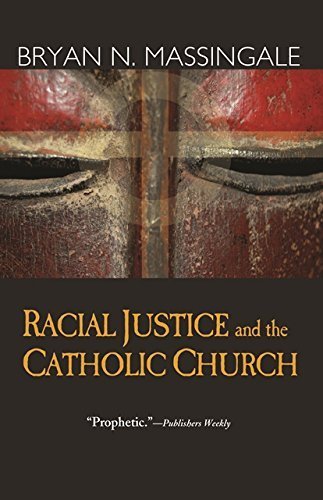The path to racial solidarity
By Beth Allen, director of affiliation
“Every sister and affiliate needs to get a copy,”
stated affiliate Mike Schnitzius.
“Of the books I have read on white privilege,
this is my favorite by far,” affirmed affiliate Mary Garves.

The book is “Racial Justice and the Catholic Church” by Bryan Massingale, an African American priest, and FSPA and affiliates were invited to participate in a virtual book study series to unpack the experience of reading it. All who joined agreed that Father Bryan’s writing is powerful and eerily relevant to the heightened racial tensions we are facing today.
Father Bryan challenges the Christian community to confront racism in our society and churches, laying out not only a historical perspective of how we got here but offering practical action steps that can take us where we need to go. Debunking the myth of a so-called “post-racial” society, he defines racism as a culture which includes the justification of systems of white privilege in America today. He further points out that culture shapes consciousness and influences our actions, or lack thereof, as laity.
I have found myself bewildered when turning on the news as of late. Who are these people shouting racist profanities? Where is this outrage and hate coming from? Father Bryan describes this dynamic with ease: the emerging multiracial and multicultural society in America is relatively new and for some causes great fear and resistance. As we are no longer a white Christian nation, many white Christians are in culture shock. That is to say, we’re operating in an entirely different social environment that causes uncertainty and anxiety. Consider how much attention was given to former president Barack Obama specific to his non-white race.
The late James H. Cone, known as the founder of Black liberation theology, once pointedly said, “It is amazing that racism could be so prevalent and violent in American life and yet so absent in white theological discourse.” Father Bryan unpacks this reality further by providing an analysis of Catholic social teaching and Protestant statements on racism. “I was outraged to learn about the longstanding silence from leadership of the Catholic Church on this,” admitted affiliate Joan Gerhards in our discussion.
Is the Catholic Church a “white racist institution”? Father Bryan would suggest that it is, and we all found ourselves agreeing. What makes the Church white and racist is not that the majority of its members are white (this is no longer true in many places) or because members engage in bigotry. What makes it a white, racist institution, he argues, “is the pervasive belief that European aesthetics, music, theology and persons — and only these — are standard, normative, universal and truly Catholic.”
To challenge ourselves and engage in this tension, Father Bryan outlined a path to interracial reconciliation that includes recognition, responsibility, reconstruction and reparation. Examining this together, we found ourselves sharing personal experiences of racism and ways in which we heard our voices confronting it. We also spoke of leaning into our Franciscan understanding of Eucharist, inviting the most unlikely guests to our table. Can we influence our faith communities to redefine and expand what it means to be Catholic or Christian in how we worship? How do we promote racial solidarity as a community of sisters and affiliates? I admit that I do not have all the answers, but thanks to this important, reflective time together, I understand more of the story … and my part in it.
Also in the September 2020 e-edition of Presence:
FSPA welcomes Sister Michele Pettit into first profession
Who is my Sister?
How COVID-19 opened hearts
Walking, virtually, with women discerning religious life
Jubilee celebrations
